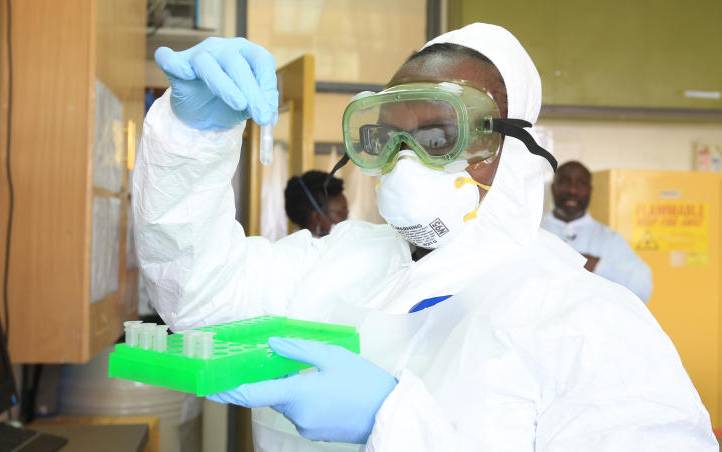
KEMRI lab scientist Dr Edith Koskei displays coronavirus samples obtained from the public at the Sample Management and Reception facility in Nairobi on March 24, 2020. [Stafford Ondego, Standard]
Kenya Medical Research Institute (KEMRI) has started manufacturing Covid-19 rapid test kits to ease the testing burden at the State’s facilities.
KEMRI, which is leading in sampling Covid-19 cases, has had a production unit for some years. It has been operating on a need-basis production of hand sanitisers, diagnostic testing kits, and other products for the region but now with Covid-19 the need is much higher.
The move is part of the government effort to start working on factors that will facilitate mass testing for its residents.
The rapid testing kits to facilitate the need to conduct as many tests in a day as possible is underway.
It is a simple kit just like the others that are used in HIV testing, with three unilateral lines that will check for any SARS-like virus.
How it works
While conducting the test, a sample of the swab is put on the rapid testing kit to allow it to pass through the membranes. If it goes to one line it shows one is negative, but if it ends up with several lines then there's a likelihood that one has the virus.
Once a swab is taken from an individual whether positive or not, it is transported to the testing centre via a virus transport media.
This is a liquid medium that kills all the other antigens living the Covid-19 virus. The virus transport medium is manufactured at KEMRI of which 20,000 litres are made per day. Each sample of the swab requires about 2-3 millimetres of the virus transport medium.
Once a sample is taken to the lab, the DNA of the virus is extracted to identify if it is Covid-19. The process requires a lot of manual work that is why a rapid testing kit can change the game during this pandemic.
It takes about three to 15 minutes to get the results on the rapid testing kits, they are portable and can readily and easily be taken to fields unlike the big machines in the labs.
The kits are also easy to use which makes it friendly for people who need privacy since one can test from the convenience of their houses.
The big machines that are currently in use in various laboratories across the country are known as Polymerase Chain Reaction machines (PCR).
They take longer, about 3 hours, while some take about an hour although it is highly accurate the biggest challenge is collecting samples countrywide to be validated using the PCR machines.
Rapid testing kits might be the solution if the government wants to achieve mass testing in the country.
Upon completion of the production of the first rapid test kits, which is currently underway, the first report will be presented next week.
Aside from the kits, automated machines which are more efficient than the PCR machines are in the country lying still in the laboratories.
The good news is, test reagents from Roche Company that developed Cobus 8800 one of the highly automated machines in the country, will be arriving in the country today at midnight.
The machine will be able to run about 10,000 samples in a day which will be a major boost from the usual manual tests.
Currently, in counties, the gene expert machine is being used which runs about 20 tests in a day. The machine was previously used in running TB and HIV samples.
The country has recorded 158 cases of coronavirus with 6 deaths and four have recovered. The number of those sampled stands at 4, 000 plus which is still low in comparison to countries that conduct mass testing.
 The Standard Group Plc is a multi-media organization with investments in media
platforms spanning newspaper print
operations, television, radio broadcasting, digital and online services. The
Standard Group is recognized as a
leading multi-media house in Kenya with a key influence in matters of national
and international interest.
The Standard Group Plc is a multi-media organization with investments in media
platforms spanning newspaper print
operations, television, radio broadcasting, digital and online services. The
Standard Group is recognized as a
leading multi-media house in Kenya with a key influence in matters of national
and international interest.











